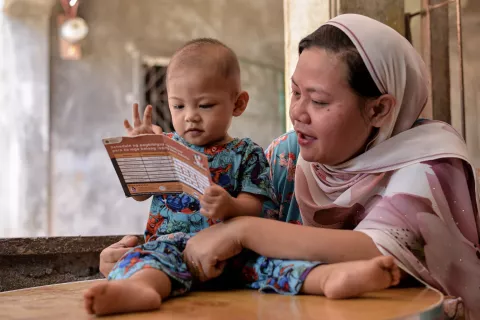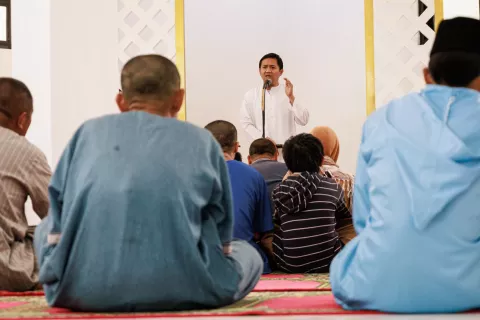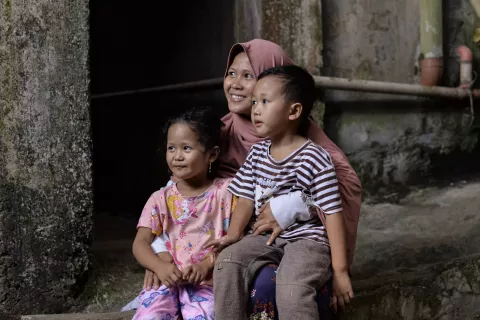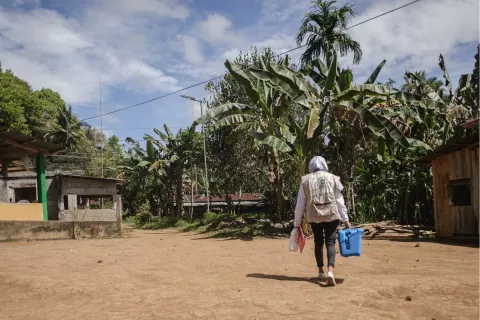Measles and pertussis outbreaks a wake-up call for the Philippines
Nearly 900 children in the Philippines died of measles in the last five years [1]
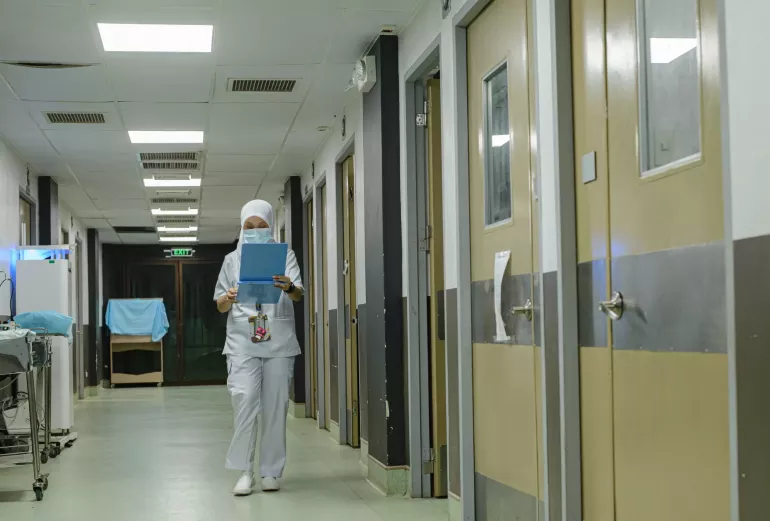
COTABATO/MANILA, 24 April 2024—As the world commemorates World Immunization Week starting today, the Philippines is experiencing measles outbreaks in the Bangsamoro region and pertussis outbreaks in parts of Luzon and Visayas, while nearly 70 per cent of provinces and cities2 are at high risk of polio. All three are highly infectious diseases for children.
The Bangsamoro Autonomous Region in Muslim Mindanao embarked on a Measles Outbreak Response Immunization at the beginning of the month after declaring the outbreak mid-March. The region had already reported more than 500 measles cases prior to the start of the campaign on 1 April. This number is already half of the cases reported for almost the entire 2023 and could be much higher, troubling for a region that has great aspirations for its children and its future.
The outbreak response, extended beyond its original two-week run, saw varying levels of support by local authorities, with some experiencing governance issues, that yielded uneven vaccine coverage.
Health workers stretched to the limit suffer crippling heat from El Niño as they conduct house-to-house vaccinations. Some Bangsamoro health workers families received vaccine refusals and deferrals during the measles campaign, due to misconceptions as well as vaccine fatigue.
A year before the regional parliamentary elections, the health of thousands of Bangsamoro children hangs in the balance. Beyond controlling the measles outbreak, routine vaccines of children such as polio and diphtheria must be administered to achieve herd immunity and improve the prospects of the Bangsamoro people. The region has the lowest health, nutrition, education and other well-being indicators as compared to their peers in other parts of the Philippines.
“Immunization is one of the crucial components of a robust health system. On the 50th year of the Essential Programme of Immunization, we’ve gone from a world where the death of at least one child was something every parent expected, to a world where every child has a chance if they get their vaccines. To stem the outbreak, we urge leaders to go to the hardest-hit communities to with their own eyes the many challenges being faced by families and health workers,” UNICEF Philippines Representative Oyunsaikhan Dendevnorov said.
To support the measles and pertussis outbreaks, UNICEF is helping the emergency procurement of two million doses of measles vaccines, fielding immunization coordinators, cold chain managers and social mobilizers in the poorest performing provinces, engaging community leaders to address refusals, and providing cold rooms to keep the vaccines potent, among others.
One million measles vaccines are projected to arrive in the coming weeks, with a million more expected in the coming months.
To end vaccine-preventable diseases among children, UNICEF calls on the national and regional government to address both supply and demand challenges. It must improve predictability of stock-outs of vaccines, employ more vaccination teams, provide better support and compensation for barangay health workers, and prepare the health system for shocks such as disasters and climate change. On the demand side, it must strengthen social preparation of communities before any immunization campaigns, improve social listening, and intensify engagement of community influencers. UNICEF calls on the government, community leaders, civil society, private sector, parents, and the whole of society to work together to ensure that each child not only survives but thrives.
Filipino version
Cotabato/Manila, 24 April 2024 — Habang ginugunita ng buong mundo ang World Immunization Week ngayong linggo, ang Pilipinas ay nasa gitna ng outbreak ng tigdas sa Bangsamoro, at tuspirina o pertussis sa mga parte ng Luzon at Visayas, habang mahigit sa 70 porsyento na probinsya at siyudad2 sa bansa ay high risk na rin sa sakit na polio.
Kinasa ng Bangsamoro Autonomous Region in Muslim Mindanao o BARMM ang Measles Outbreak Response Immunization (MORI) noong Abril 1 matapos nitong mag-deklara ng outbreak ng tigdas nung kalagitnaan ng Marso. Bago pa man nagsimula ang outbreak, naitala na ang higit sa 500 kaso ng tigdas sa rehiyon – halos kahalati na ng naitalang kaso sa buong rehiyon noong 2023. Maaring mas mataas pa ang bilang ng kaso – isang nakakabahalang realidad para sa isang rehiyong mataas ang pangarap para sa mga kabataan at sa kanilang kinabukasan.
Pinahaba pa ang orihinal na dalawang linggo na MORI. Dahil magkakaiba ang antas ng pakikilahok mula sa mga lokal na opisyal, hindi rin pantay pantay ang numero ng mga nabakunahang kabataan.
Ang mga health worker ay pagod na rin habang sila ay nagbabahay-bahay sa gitna ng mainit na panahon dulot ng El Niño. May mga magulang din na tumangging pabakuahan ang kanilang mga anak dahil sa iba’t-ibang dahilan tulad ng maling impormasyon. Ang iba ay napagod na dahil sa pagpapaturok ng iba’t ibang bakuna.
Isang taon bago ang parliamentary na eleksyon sa rehiyon, ang kalusugan ng libo-libong kabataang Bangsamoro ay nanganganib. Higit sa pag kontrol ng outbreak ng tigdas, ang mga routine vaccines ng mga bata gaya ng polio at diphtheria ay kailangang maibigay para makamit ang herd immunity at mapabuti ang kinabukasan ng mga Bangsamoro. Ang rehiyon na ito ang may pinaka mababang antas ng kalusugan, nutrisyon, edukasyon at kagalingan kumpara sa ibang kabataan sa ibang parte ng Pilipinas.
“Ang pagbabakuna ay isa sa mga kritikal na bahagi ng isang matatag na health system. Sa ika-50 anibersaryo ng Essential Programme of Immunization, nagmula tayo sa isang mundo na ang pagkamatay ng isang bata sa pamilya ay isang bagay na inaasahan ng mga magulang, sa isang mundo na ang bawat bata ay may pagkakataong mabuhay kung siya ay mababakunahan. Upang sugpuin ang outbreak, inaanyayahan namin ang ating mga lider na pumunta sa mga pinaka mahirap na komunidad para kanilang makita ang mga hamon na nararanasan ng mga pamilya at mga health workers,” sabi ni UNICEF Philippines Representative Oyunsaikhan Dendevnorov.
Bilang suporta sa outbreak ng tigdas at tuspirina, ang UNICEF ay tumutulong sa pagbili ng 2 milyong dose ng bakuna laban sa tigdas, pagpapadala ng mga immunization coordinators, cold chain managers at social mobilizers sa mga probinsyang nangangailangan ng tulong, pakikipagtulungan sa community leaders upang ipaliwanag na ang mga bakuna ay ligtas at halal, at pagpapatayo ng mga cold room upang mapanatiling epektibo ang mga bakuna.
Isang milyong dose ng bakuna ang inaasahang dumating sa Pilipinas sa mga darating na linggo. Ang susunod na 1 milyong dose naman ay darating sa mga susunod na buwan.
Upang masugpo ang mga sakit na maaring maiwasan gamit ang mga bakuna, tinatawagan ng UNICEF ang national at regional government na solusyunan ang mga hamon sa supply at demand. Dapat nitong ayusin ang isyu ng stock-out ng mga bakuna, mag-hire pa ng maraming vaccination teams, bigyan ng karagdagang suporta at sapat na sweldo ang mga barangay health workers, at paghandaan ang mga dagok na maaring dumating gaya ng sakuna at climate change. Sa usapan ng demand, dapat nitong pagtibayin ang social preparation sa mga komunidad bago magsagawa ng mga immunization campaign, pagbutihin ang social listening, at pag-igtingin ang pakikipag-tulungan sa mga community influencers. Tinatawagan ng UNICEF ang gobyerno, mga lider sa komunidad, civil society, pribadong sektor, mga magulang, at ang buong pamayanan na magtulungan upang ang bawat bata ay hindi lang mabuhay kundi magtagumpay
1 WHO data 2018-2023 measles deaths: 898
2 WHO Polio Risk Assessment, 2022-2023
Media contacts
About UNICEF
UNICEF promotes the rights and wellbeing of every child, in everything we do. Together with our partners, we work in 190 countries and territories to translate that commitment into practical action, focusing special effort on reaching the most vulnerable and excluded children, to the benefit of all children, everywhere.
For more information about UNICEF and its work for children in the Philippines, visit www.unicef.ph.
Follow UNICEF Philippines on Facebook, Instagram, LinkedIn, TikTok and Twitter and YouTube.

